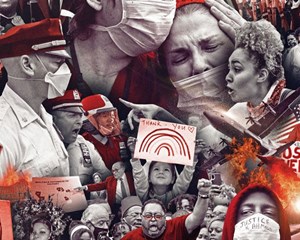OUR AWFUL YEAR
糟糕的一年
2020 TESTED US BEYOND MEASURE. WHERE DO WE GO FROM HERE?
2020年對(duì)我們的考驗(yàn)無(wú)以估量,下一步該怎么走?
THIS IS THE STORY OF A YEAR YOU'LL NEVER WANT TO REVISIT.
這一年發(fā)生的事情你絕對(duì)不想重溫
There have been worse years in U.S. history, and certainly worse years in world history, but most of us alive today have seen nothing like this one. You would need to be over 100 to remember the devastation of World War I and the 1918 flu pandemic; roughly 90 to have a sense of the economic deprivation wrought by the Great Depression; and in your 80s to retain any memory of World War II and its horrors. The rest of us have had no training wheels for this—for the recurrence of natural disasters that confirm just how much we have betrayed nature; for an election contested on the basis of fantasy; for a virus that originated, possibly, with a bat only to upend the lives of virtually everyone on the planet and end the lives of roughly 1.5 million people around the world.
美國(guó)歷史上曾有過(guò)糟糕的歲月,當(dāng)然,世界史上也有過(guò)糟糕的歲月。然而,大多活在當(dāng)今時(shí)代的我們卻從未經(jīng)歷過(guò)如今這般糟糕的境地。你需要在100歲以上才能記得第一次世界大戰(zhàn)的破壞和1918年的西班牙大流感;你需要在大約90歲才能體會(huì)到大蕭條時(shí)期的經(jīng)濟(jì)匱乏;你需要在80多歲才能對(duì)第二次世界大戰(zhàn)的恐怖為之一顫。剩下的人呢?則對(duì)重大變故毫無(wú)經(jīng)驗(yàn)——自然災(zāi)害再現(xiàn),證實(shí)了我們對(duì)自然的背叛程度;一場(chǎng)基于幻想的選舉;一種可能起源于蝙蝠的病毒,打亂了地球上幾乎所有人的生活,終結(jié)了全球約150萬(wàn)人的生命。
My job as a film critic is to look at movies and tease out their connections both to the greater world and to our lives. If 2020 were a dystopian movie, you'd probably turn it off after 20 minutes. This year wasn't doomily thrilling, like a fictional apocalypse. It was, in addition to being wrought with pain, maddeningly mundane, the routine of the everyday turned against us.
作為影評(píng)人,我的工作就是看電影,梳理出它們與更廣闊的世界和我們的生活之間的聯(lián)系。如果《2020》是一部反烏托邦電影,你可能看了20分鐘就會(huì)關(guān)掉。今年并沒(méi)有像虛構(gòu)的世界末日那樣驚心動(dòng)魄,除了被痛苦折磨,它單調(diào)得令人發(fā)狂,循環(huán)往復(fù)的日常生活讓人難以忍受。

Our most debilitating threat this year was a sense of helplessness, and it ran unchecked. Although it's universal among humans to believe in their own fortitude, Americans, in particular, are conditioned to believe they can triumph over any crisis. But not since the spread of fascism in the 1930s—a threat America didn't actively recognize until the dawn of the 1940s—have we been faced with so many abnormal events that have been so egregiously distorted by aberrant leadership. We confronted the unspeakable, only to be deviously reassured that none of it was a big deal. A virus will magically "disappear." Don't worry, every vote will be counted—maybe. America will be great again, if only everybody would just get back to work—and though a mask is optional, wearing one sure makes you look dumb.
今年,我們面臨的最令人衰弱的威脅是一種無(wú)助感,而且這種無(wú)助感一直在蔓延。雖然大多數(shù)人類(lèi)都相信自己的堅(jiān)韌,尤其是美國(guó)人,他們習(xí)慣于相信自己能夠戰(zhàn)勝任何危機(jī)。但自從20世紀(jì)30年代法西斯主義蔓延以來(lái)——美國(guó)直到20世紀(jì)40年代才真正認(rèn)識(shí)到這一威脅——我們從未面臨過(guò)如此多的異常事件,這些異常事件被神經(jīng)質(zhì)的領(lǐng)導(dǎo)人嚴(yán)重扭曲。我們面對(duì)的是不可奉告的事情,只是被間接保證一切安好。病毒會(huì)神奇般地“消失”。不用擔(dān)心,每張選票都會(huì)被計(jì)算在內(nèi)——或許吧。只要大家都回去工作,美國(guó)就會(huì)再次偉大——雖然你可以選擇戴不戴口罩,但戴了肯定會(huì)顯得你很蠢。
Gaslighting has been a major feature of American civic life since 2016, but in 2020 it reached new heights of outlandishness, making many of us feel as if we'd been pushed to the other side of the looking glass. We spent countless hours stuck at home and connected to the often untrustworthy hive mind of social media, wringing our hands and pointing out injustices, only to end up feeling even more paralyzed by the very people who are meant to protect us. The enemy sought to divide us, and succeeded.
自2016年以來(lái),“煤氣燈效應(yīng)”一直是美國(guó)公民生活的一大特色,但到了2020年,它的離奇程度上升到了新的高度,很多人感覺(jué)自己好像被推到了鏡子的另一邊。我們花了無(wú)數(shù)個(gè)小時(shí)呆在家里,與社交媒體上那些通常不值得信任的蜂群思維聯(lián)系在一起,搓著手對(duì)不公正的事情指指點(diǎn)點(diǎn),結(jié)果卻被本應(yīng)保護(hù)我們的人搞得更加不知所措。敵人企圖分裂我們,并且成功了。
譯文由可可原創(chuàng),僅供學(xué)習(xí)交流使用,未經(jīng)許可請(qǐng)勿轉(zhuǎn)載。











